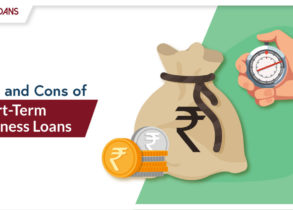Sep 23, 2019

BE GST-COMPLIANT FOR A HIGHER PROBABILITY OF OBTAINING A BUSINESS LOAN: HERE’S HOW
The recent-most tax reform, namely Goods and Services Tax (GST) has been conceptualized with the aim of increasing decentralization, increasing business opportunities and increasing the GDP of the country. Small and Medium Enterprises (SME) is a considerably large segment of the business sector of India and entrepreneurs are evaluating how to best capitalize on the possibilities provided by GST. It should be the country’s prerogative to provide an environment conducive for this, so that the country may gain in terms of GDP and even exports.
For doing this, first of all, proper, complete and easily understandable information should be clearly disseminated regarding all the terms and conditions of GST, so that the enterprises can then take the necessary steps to comply with terms. Next, the question that arises is why these enterprises should even take the trouble of understanding and fulfilling the conditions of GST. Hence, enterprises should recognize the potential of this policy holds for them, to be able to appreciate and accept it fully and commit to it.
Let us thus talk about one of the most obvious and important aspects of running a business – finance! Some seed money and constant turn-over are both important for a sustainable and successful business. Most enterprises, however small or large, require a loan, and being GST-compliant makes it easy to get this business loan. This is the reason just enough to be GST-compliant! We will now explain how this increases the chances of getting the desired loan amount being GST-compliant.
WHAT IS GST?
The Goods and Service Tax Act was introduced in India in 2017, to work as a single tax system rather than having several indirect taxes. An initial draft of the law had been formulated by a committee as early as 2000. It is a comprehensive tax system, having several stages and applicable for all value additions. It follows a uniform law across the country.
HOW GST AFFECT SOLVENCY?
Whether an enterprise is worthy of credit or not, depends largely on how the enterprise performed on previous loans (past credit behavior). Even with a high credit score, the banking sector is becoming increasingly wary of sanctioning loans, and becoming increasingly stringent with assessment criteria, especially towards small and medium enterprises. This is because banks need to try and minimize their own losses due to bad loans.
In such a scenario, if an enterprise complies with all the norms of GST, it provides a strong footing to the enterprise and reassurance for the bank, greatly enhancing the probability of a loan being approved.
INVOICE TRACKING: BENEFITS THROUGH GST BUSINESS LOAN
Every business transaction, to be considered complete, needs to have an invoice as a record. After the enforcement of GST, this requirement has become even more obligatory. Earlier, banks had faced issues of under-invoicing, especially where imports were involved in businesses, as an attempt to bypass customs duty. Hence, getting loans for such businesses used to be a problem for every MSME, even though they were not real defaulters. With GST however, since invoicing is mandatory, making it possible to have a national level tracking mechanism, banks are no more wary of such possibilities, making them more open to sanction loans for businesses, especially for those that require imports.
In short, GST has compulsorily made transactions more transparent and hence the credibility of businesses has automatically improved, allowing them to receive GST business loans.
ORGANIZED LOANS: EFFECTS OF GST
Assessment for passing business loans is not a straightforward activity and requires several considerations, such as the size of the business, number of employees, turn-over, etc. As GST gets implemented, even small enterprises become a part of the organized sector, following all norms of the sector, such as transparency in their accounts and tax declarations. Being in the organized sector, in turn, allow for their favorable credit assessment.
GST AND EASE OF DOING BUSINESS
- Business initiation: Earlier, if one wanted to start a business and take it to several states, they would need to apply for VAT registrations for each of the states. Hence, they would need to study the rules and comply with them for each state. Moreover, these rules used to be quite varied across states, making matters more difficult for small entrepreneurs. GST offers more uniform and clear rules across states and the portal allows for ease in application and compliance.
- Transparency in processes: Financial record maintenance is an arduous task and often MSMEs try to avoid investing in human resources just to take care of this aspect of the business. However, unwittingly, they end up spending more time and money, later on, to complete their account books and deal with taxation offices. GST allows for setting up streamlined processes at the beginning itself, facilitating transparent record maintenance on a continuous basis.
- Visibility in the competitive environment: A marked change brought about by GST is that the tax is levied on the basis of the destination of a sale and not the source place of the product. The impact this has is that locally made products and imported products, both involve the same amount of tax! GST also levies a tax on stock transfer of goods, bringing large multinationals and MSMEs on a level playing field. Hence, there is an unprecedented opportunity for small and local manufacturers to compete with global markets.
- The decrease in tax burden: The minimum threshold turnover that made a small business applicable for tax (VAT) was Rs. 5 lakh (Rs 10 lakh in the North East). Hence, even very small businesses had to pay substantial tax. The norms under GST have changed significantly, shifting this minimum bar to Rs. 20 lakh. This gives small businesses a much better chance to flourish at the grassroots level, get established with a decent revenue, and only then fall under the category where they need to pay GST.
- Improved cash flow: The GST law allows enterprises to apply for a loan for their expenses incurred as part of supplies, such as raw materials. The tax payable on the inputs can be balanced out by the tax collected through sales. Hence, the tax on inputs remains a credit till sales and hence profits are made. This flexibility improves cash flow and budgeting for setting up processes.
- Inter-state flow: The bureaucracy at border transfers is greatly reduced in the GST regime as a lot of paper-work has been eliminated. The transport and logistics hence become smoother, faster and cost-effective, reducing the overall budget for logistics and in-transit loss of goods.
GET YOUR BUSINESS LOANS FROM FLEXILOANS: KNOW WHY
- We value your rights: We offer and clearly explain all the government benefits
- We understand your needs: We ensure that the initiating cost is as low as possible
- We value time: We approve business loans quickly, allowing you to start your business soon
- We know your priorities: We simplify tax processes to let you focus on your work.
- We don’t demand several documents but just a few: We require only personal KYC, residential address proof, recent 6 months bank statement (current account) in PDF format, and GST registration certificate.







